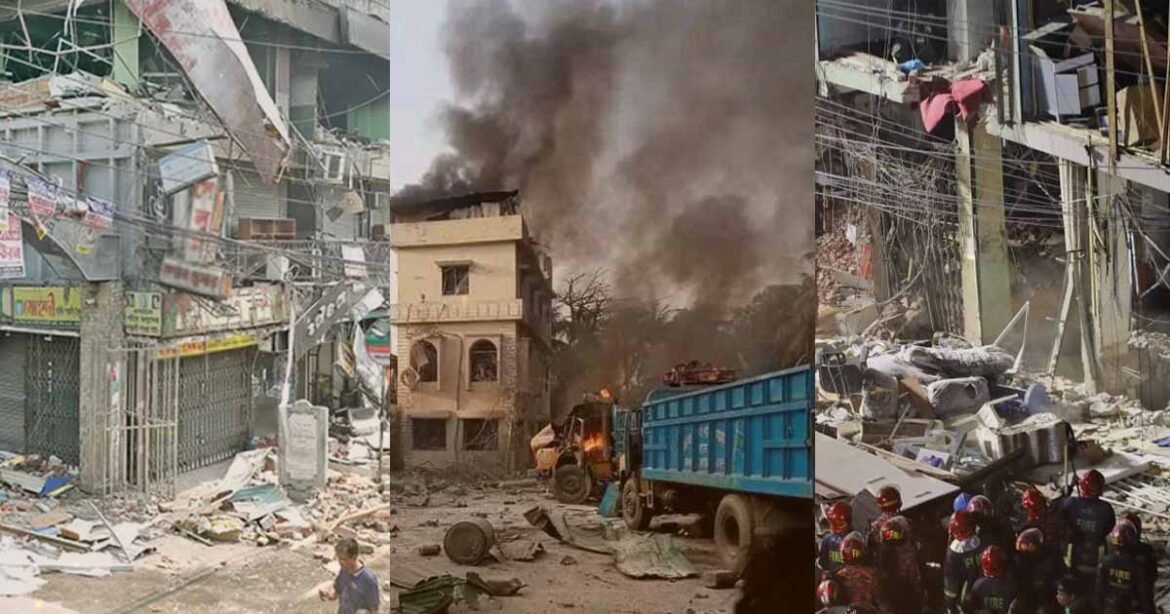Two consecutive blasts in Dhaka, one in the commercial building in New Market and another in Sitakunda in Chittagong, left nine people dead and more than 40 people injured. This is yet another tragic incident that has highlighted the unsafe and unregulated nature of industries and commercial spaces across Bangladesh. The loss of lives is not the only effect, as it has a negative impact on the country’s image on the global stage.
Effect on Bangladesh’s image
Repeated fire incidents in Bangladesh have caused the country’s image to deteriorate globally, causing a probable negative impact on exports. This is because international buyers assume that the products they are purchasing are non-compliant with fire and worker safety regulations. Faruque Hassan, the Bangladesh Garment Manufacturers and Exporters Association (BGMEA) president, the apex trade body for readymade garment manufacturers, believes that there should be zero tolerance for workplace safety issues. He also stated that the BGMEA is working constantly to ensure that the number of fire incidents has decreased in the RMG factories. Dhaka North Mayor Atiqul Islam stated that the non-garment factories should learn a lesson from the RMG industry to improve their workplace, and BGMEA is prepared to share knowledge with other industries.
You Can Also Read: Death toll rises to 14; 100 plus injured in Gulistan blast
Impact on non-RMG sector
The Centre for Policy Dialogue (CPD) conducted a study in January last year that showed a decline in safety standards in non-RMG industries due to weak factory infrastructures and inadequate monitoring by government agencies. The non-RMG sector has yet to follow the RMG sector’s footsteps to improve workplace safety issues. The BGMEA has stated that the government needs to be stricter with non-garment factories in terms of license, permissions, and auditing factories.
Investigation and accountability
To date, no one has been held accountable for any of the nine fire tragedies that have occurred in Bangladesh in the last 13 years. Moreover, most of these cases have not seen much progress in their investigations. For instance, the investigation for the 2021 Hashem Foods Factory fire and the 2022 BM Container Depot fire is still ongoing.
Is there a way-out?
Experts believe that the government needs to be stricter with non-garment factories in terms of license, permissions, and auditing factories. Factories must also ensure proper infrastructure and safety regulations. The non-RMG sector should follow the RMG sector’s footsteps to improve workplace safety issues. This would entail the government taking a stricter stance on licensing and auditing factories to ensure the safety of workers. The government should also hold people accountable for any fire accidents that occur in the future.
Moreover, experts agree that a collaborative effort from the government and private sector is required to improve fire safety issues in factories. Faruque Hassan, President of BGMEA, stated that the association needs to come forward, and the government needs to ensure compliance with fire safety regulations.
Sameer Sattar, President of Dhaka Chamber of Commerce and Industry, emphasized the importance of raising awareness and implementing rules and regulations to improve fire safety in the private sector. He also stressed the need for enhanced inspections of factories and identifying the root cause of recurring fire incidents.
To conclude, the consecutive blasts in Dhaka have once again highlighted the need for Bangladesh to address workplace safety issues across all sectors. It is essential to ensure that the workers’ safety and health are prioritized. With this in mind, the government should take appropriate action to prevent such tragedies from happening in the future.


